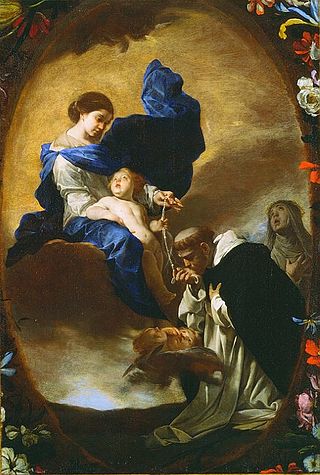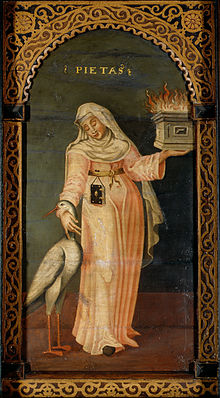Theological virtues are virtues associated in Christian theology and philosophy with salvation resulting from the grace of God. Virtues are traits or qualities which dispose one to conduct oneself in a morally good manner. Traditionally the theological virtues have been named faith, hope, and charity (love). They are coupled with the four natural or cardinal virtues, and opposed to the seven deadly sins.

The Rosary, also known as the Dominican Rosary, refers to a set of prayers used primarily in the Catholic Church, and to the physical string of knots or beads used to count the component prayers. When referring to the prayer, the word is usually capitalized ; when referring to the prayer beads as an object, it is written with a lower-case initial letter.

Worship is an act of religious devotion usually directed towards a deity or god. For many, worship is not about an emotion, it is more about a recognition of a God. An act of worship may be performed individually, in an informal or formal group, or by a designated leader. Such acts may involve honoring.

Pietas, translated variously as "duty", "religiosity" or "religious behavior", "loyalty", "devotion", or "filial piety", was one of the chief virtues among the ancient Romans. It was the distinguishing virtue of the founding hero Aeneas, who is often given the adjectival epithet pius ("religious") throughout Virgil's epic Aeneid. The sacred nature of pietas was embodied by the divine personification Pietas, a goddess often pictured on Roman coins. The Greek equivalent is eusebeia (εὐσέβεια).

Veneration, or veneration of saints, is the act of honoring a saint, a person who has been identified as having a high degree of sanctity or holiness. Angels are shown similar veneration in many religions. Veneration of saints is practiced, formally or informally, by adherents of some branches of all major religions, including Christianity, Judaism, Hinduism, Islam, Buddhism and Jainism.

Euthyphro, by Plato, is a Socratic dialogue whose events occur in the weeks before the trial of Socrates, between Socrates and Euthyphro. The dialogue covers subjects such as the meaning of piety and justice. As is common with Plato's earliest dialogues, it ends in aporia.

The seven gifts of the Holy Spirit are an enumeration of seven spiritual gifts first found in the book of Isaiah, and much commented upon by patristic authors. They are: wisdom, understanding, counsel, fortitude, knowledge, piety, and fear of the Lord.

Catholic Mariology is the systematic study of the person of Mary, mother of Jesus, and of her place in the Economy of Salvation in Catholic theology. According to the doctrine of the Immaculate Conception taught by the Catholic Church, Mary was conceived and born without sin, hence she is seen as having a singular dignity above the saints, receiving a higher level of veneration than all angelic spirits and blessed souls in heaven. Catholic Mariology thus studies not only her life but also the veneration of her in daily life, prayer, hymns, art, music, and architecture in modern and ancient Christianity throughout the ages.

Marian devotions are external pious practices directed to the person of Mary, mother of Jesus, by members of certain Christian traditions. They are performed in Catholicism, High Church Lutheranism, Anglo-Catholicism, Eastern Orthodoxy and Oriental Orthodoxy, but generally rejected in other Christian denominations.

Catholic devotions are particular customs, rituals, and practices of worship of God or honour of the saints which are in addition to the liturgy of the Catholic Church. The United States Conference of Catholic Bishops describes devotions as "expressions of love and fidelity that arise from the intersection of one's own faith, culture and the Gospel of Jesus Christ". Devotions are not considered part of liturgical worship, even if they are performed in a church or led by a priest, but rather they are paraliturgical. The Congregation for Divine Worship at the Vatican publishes a Directory on Popular Piety and the Liturgy.
Eusebeia is a Greek word abundantly used in Greek philosophy as well as in Greek translations of texts of Indian religions and the Greek New Testament, meaning to perform the actions appropriate to the gods. The root seb- (σέβ-) is connected to danger and flight, and thus the sense of reverence originally described fear of the gods.

Popular piety in Christianity is an expression of faith which avails of certain cultural elements proper to a specific environment which is capable of interpreting and questioning in a lively and effective manner the sensibilities of those who live in that same environment. Its forms in the Roman Catholic Church are explained in the Directory on Popular piety and the liturgy issued by the Congregation for Divine Worship and the Discipline of the Sacraments of the Catholic Church. In the Lutheran Churches, popular piety is expressed through the reception of the sacraments, the displaying of sacred art, the signing of hymnody, prayer, Bible study and devotions.

Prayer in the Catholic Church is "the raising of one's mind and heart to God or the requesting of good things from God." It is an act of the moral virtue of religion, which Catholic theologians identify as a part of the cardinal virtue of justice.

Reparation is a Christian theological concept closely connected with those of atonement and satisfaction. In ascetical theology, reparation is the making of amends for insults given to God through sin, either one's own or another's. The response of man is to be reparation through adoration, prayer, and sacrifice. In Roman Catholic tradition, an act of reparation is a prayer or devotion with the intent to expiate the "sins of others", e.g. for the repair of the sin of blasphemy, the sufferings of Jesus Christ or as Acts of Reparation to the Virgin Mary.

May devotions to the Blessed Virgin Mary refer to special Marian devotions held in the Catholic Church during the month of May honoring Mary, mother of God, as "the Queen of May". These services may take place inside or outside. A "May Crowning" is a traditional Roman Catholic ritual that occurs in the month of May.

The Mariology of the popes is the theological study of the influence that the popes have had on the development, formulation and transformation of the Roman Catholic Church's doctrines and devotions relating to the Blessed Virgin Mary.

The veneration of Mary in the Catholic Church encompasses various devotions which include prayer, pious acts, visual arts, poetry, and music devoted to her. Popes have encouraged it, while also taking steps to reform some manifestations of it. The Holy See has insisted on the importance of distinguishing "true from false devotion, and authentic doctrine from its deformations by excess or defect". There are significantly more titles, feasts, and venerative Marian practices among Roman Catholics than in other Western Christian traditions. The term hyperdulia indicates the special veneration due to Mary, greater than the ordinary dulia for other saints, but utterly unlike the latria due only to God.

Fear of God or Theophobia may refer to fear itself, but more often to a sense of awe, and submission to, a deity. People subscribing to popular monotheistic religions for instance, might fear Hell and divine judgment, or submit to God's omnipotence.

Religion is a distinct moral virtue whose purpose is to render God the worship due to Him as the source of all being and the giver of all good things. As such, in Christianity it is part of the cardinal virtue of Justice, and falls under obedience to the First Commandment.
Evangelii gaudium is a 2013 apostolic exhortation by Pope Francis "On the proclamation of the Gospel in today's world". In its opening paragraph, Pope Francis urged the entire Church "to embark on a new chapter of evangelism". According to the exhortation, the Church must understand itself as a community of missionary disciples, who are "permanently in a state of mission".
















